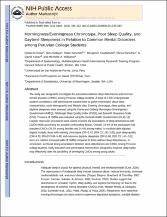Morningness/eveningness chronotype, poor sleep quality, and daytime sleepiness in relation to common mental disorders among Peruvian college students

Ver/
Trabajo
(application/pdf: 178.4Kb)
(application/pdf: 178.4Kb)
Fecha
2015-04Autor(es)
Deborah, Rose
Gelaye, Bizu
Sanchez, Sixto
Castañeda, Benjamín
Sanchez, Elena
Yanez, N. David
Williams, Michelle A.
Metadatos
Mostrar el registro completo del ítemResumen
The study was designed to investigate the association between sleep disturbances and common mental disorders (CMDs) among Peruvian college students. A total of 2538 undergraduate students completed a self-administered questionnaire to gather information about sleep characteristics, sociodemographic, and lifestyle data. Evening chronotype, sleep quality, and daytime sleepiness were assessed using the Horne and Ostberg morningness–eveningness questionnaire, Pittsburgh Sleep Quality Index, and Epworth Sleepiness Scale, respectivelty. Presence of CMDs was evaluated using the General Health Questionnaire. Logistic regression procedures were used to examine the associations of sleep disturbances with CMDs while accounting for possible confounding factors. Overall, 32.9% of the participants had prevalent CMDs (39.3% among females and 24.4% among males). In multivariable-adjusted logistic models, those with evening chronotype (odds ratios (OR) = 1.43; 95% CI 1.00–2.05), poor sleep quality (OR = 4.50; 95% CI 3.69–5.49), and excessive daytime sleepiness (OR = 1.68; 95% CI 1.41–2.01) were at a relative increased odds of CMDs compared with those without sleep disturbances. In conclusion, we found strong associations between sleep disturbances and CMDs among Peruvian college students. Early education and preventative interventions designed to improve sleep habits may effectively alter the possibility of developing CMDs among young adults.
Colecciones
- Artículos [274]
Materias
Editor
Routledge
Acceso
info:eu-repo/semantics/openAccess
Financiamiento
US National Institute of Health, National Institute of Minority Health and Health Disparities (T37-MD001449).
Recurso(s) relacionado(s)
https://www.ncbi.nlm.nih.gov/pmc/articles/PMC4315718/https://dx.doi.org/10.1080/13548506.2014.951367







